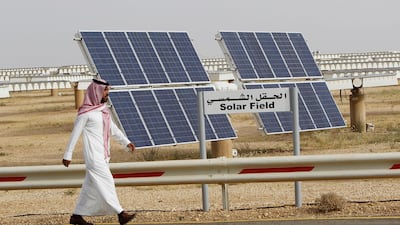Arab Petroleum Investments Corporation, the multilateral development bank focused on energy, forecasts the Middle East and North Africa region's electricity sector will need $260 billion in investments over the next five years to meet rising demand of 6.4 per cent per year.
The investment, split between $152bn for power generation and $108bn for transmission and distribution, is needed to generate an additional 117 Gegawatts of electricity, the majority of which will be concentrated in the Arabian Gulf region, it said in a report on Tuesday.
“Electricity demand and consumption have been growing rapidly in the MENA region, driven by population growth and urbanisation, rising income levels, industrialisation, and low electricity prices,” according to the report.
Several Gulf countries are increasing electricity, water and energy prices in order to narrow the fiscal deficit caused by low oil prices. They are also diversifying their energy mix, pivoting towards renewable projects to free up oil and gas used in power generation for export and other industrial use.
__________________
Read more:
Mena region to invest about $1tn in energy sector over coming five years
MENA needs $180bn investment to build power generating capacity
__________________
The Gulf region, which currently represents 47 per cent or 151GW of Mena power capacity, is projected to need $55bn in investments to add another 43GW to its grid and $34bn for distribution and transmission over the next five years.
“Some countries in the GCC, notably Saudi Arabia, have also taken steps to control demand, as a means of keeping required levels of investment in capacity at manageable levels,” said the report. “This was the thinking behind the Saudi Arabian government’s most recent round of price increases, as demand had risen significantly on the back of cheap electricity, and with lower oil revenues, subsidising high levels of consumption is no longer sustainable.”
Saudi Arabia, the world’s biggest oil exporter, will lead the power generation investments in the Gulf region in both its forms, traditional and renewable.
The kingdom will need to invest $21bn to increase capacity to 92GW as it kick starts a massive renewable energy project that includes developing 10GW of solar and wind power by 2023.
In the UAE, investments are expected reach at least $33bn to add another 16GW of power over the medium term.
At least 10GW of additional capacity is already in execution in the UAE, including 5.6GW of nuclear energy, the report said.

